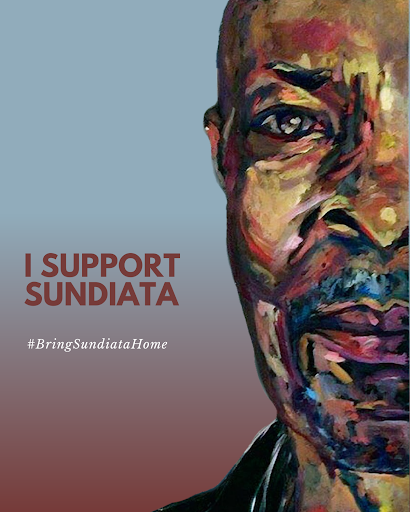
#WeBroughtSundiataHome Media Resources
Below are resources for the news media to get up to speed on Sundiata Acoli and his legal case.
Press Releases
Briefing Materials
Other Helpful Links
New Jersey State Parole Board Division of Release: key terminology and explanation of processes.
New Jersey Office Of The Public Defender Parole Project 2021 Report, details parole processes and recommends action to correct inequities.
The Color of Justice: Racial and Ethnic Disparity in State Prisons, The Sentencing Project.
Hard Time: Aging Lifers Struggle For A Way Out Of Prison, National Public Radio, Special Series
Aging In Prison: A Human Rights Problem We Must Fix, American Friends Service Committee Report
Center for Justice at Columbia University: Aging in Prison: Reducing Elder Incarceration and Promoting Public Safety, American Friends Service Committee Report
Amicus Briefs
Topic: Racial Disparities in Imprisonment and Parole
Topic: Aging and Recidivism
Topic: First Amendment Violations
Topic: Parole Board Decision Irregularities, Bias, Judicial Oversight
Racial Disparities in Imprisonment and Parole
Brief – Filed by: Charles Hamilton Houston Institute for Race & Justice Harvard Law School, Andrew Robert Burroughs, Burroughs Law on behalf of National Association of Blacks in Criminal Justice, The Black Police Experience, Blacks in Law Enforcement of America, and The Grand Council of Guardians in Support of the Appellant & Reversal.
Argument:
- Perpetual punishment is inconsistent with public safety and equality under the law.
- The purpose of parole is undermined if parole is not meaningfully available.
- Given New Jersey’s gross racial disparities in imprisonment, meaningful access to parole is required for racial equity.
- Spending on incarceration for elderly prisoners with decades of spotless disciplinary records, like Mr. Acoli, is an affront to the welfare of society.
- Mr. Acoli long ago satisfied the “punitive aspects” of his sentence, and it was arbitrary and capricious and contrary to law for the Parole Board to venture into considerations of punishment in order to deny his parole.
- The Parole Board’s explanation for denying Mr. Acoli parole is not supported by the balance of evidence in the record.
- Members of the Parole Board repeatedly probed the adequacy of Mr. Acoli’s punishment, illustrating a retributive purpose beyond their statutory authority.
Aging and Recidivism
Argument:
- The Parole Board was required to grant Acoli’s release unless it found a substantial likelihood that he would commit a crime if released.
- The Parole Board’s failure to address Acoli’s advanced age, which is a consistent predictor of future criminal activity, was an error.
- The age-crime curve, which describes a dramatic reduction in criminal activity among older offenders, is clearly evident based on national and state data.
- People convicted of murder, such as Acoli, are even less likely to recidivate upon release from prison than other criminal offenders.
- The Parole Board’s failure to account for Acoli’s advanced age, which was repeatedly raised in the record, was a reversible error.
First Amendment Violations
Argument:
- The New Jersey Constitution and The 1979 Parole Act prohibit parole denials based upon considerations other than a substantial likelihood that the person will commit another crime.
- The New Jersey Constitution mandates a parole system governed by law.
- New Jersey’s first parole act, enacted in 1948, invited arbitrary and discretionary decision-making, which led to the 1952 uprising at Rahway State Prison.
- The Parole Act of 1979 sought to make the parole process equitable, consistent and focused on the future.
- Denying parole based on a person’s political beliefs or past revolutionary ideology is inconsistent with the Parole Act and violates the First Amendment.
- The principle that a person should not be punished because of what they believe is foundational to American democracy and the constitutional order.
- The First Amendment protects potential parolees from further punishment and detention solely based on their political beliefs.
- The Parole Board’s questioning of Acoli at the Parole Board hearing demonstrates that Acoli’s past and present political beliefs improperly influenced the Board’s decision.
- The Board improperly focused on Acoli’s views about the Black Panther Party’s place in history.
- The Board improperly probed Acoli’s views about police violence and racial oppression during the 1960s and 1970s.
- The Board improperly fixated on the BLA’s ideology and reliance upon communist teachings.
- The Board improperly perseverated on Acoli’s views about what makes someone a political prisoner, what he has written, and how he thinks about his nearly half-century-long incarceration.
- The Parole Board’s reliance on a psychological report opining that Acoli would engage in protected political activity if released violated the First Amendment.
- The First Amendment protects Acoli from being denied further liberty because he does not ascribe to the state’s version of the case
Parole Board Irregularities, Judicial Oversight of the State Parole Board
Argument:
- The judiciary is constitutionally empowered and required to engage in meaningful review of the decisions of the Parole Board.
- The parole system, required to be established “by law,” must be subject to minimal standards by law.
- The judiciary has a meaningful role in ensuring that agency actions are grounded in reason.
- The Parole Board must explain its decisions in a way to permit meaningful judicial review.
Parole Board Decision Irregularities, Bias
Argument:
- Because the Parole Board has repeatedly failed to correctly apply the objective standard of the 1979 Parole Act in reviewing Acoli’s case, this court must reverse the Board’s denial and order that Acoli be paroled.
- Because the Board did not correctly apply the objective standard of the 1979 Parole Act requiring it to parole Acoli unless it demonstrated by a preponderance of the evidence that Acoli was substantially likely to commit a crime if released, The Board’s decision must be reversed.
- The Parole Act of 1979 replaced the subjective, discretionary standard of the 1948 Parole Act with an objective standard based solely on the risk of recidivism, created a presumption of parole, and shifted the burden to the Board to prove a substantial likelihood of recidivism in order to deny parole.
- Instead of applying the objective standard “confined solely to whether there is a substantial likelihood for a repetition of criminal behavior,” the Board erroneously shifted the burden of proof to Acoli to prove he was sufficiently rehabilitated to the Board’s subjective satisfaction.
- Because the Board did not correctly apply the objective standard of the 1979 Parole Act requiring it to parole Acoli unless it demonstrated by a preponderance of the evidence that Acoli was substantially likely to commit a crime if released, The Board’s decision must be reversed.
- The Board’s denial was arbitrary and capricious because it failed to consider or appropriately weigh factors the board’s own reports have shown to be statistically correlated with a lower risk of reoffending, instead basing its decision on factors that it failed to demonstrate have any relation to the likelihood of reoffending.
- The Board failed to consider or adequately weigh Acoli’s advanced age; that he had served no prior prison terms; the length of his sentence; his LSI-R score; and that his conviction is for a violent offense.
- The Board’s denial was based entirely on “lack of insight” and “denial of offense,” yet the Board failed to offer any evidence linking either factor to a substantial likelihood that Acoli would commit a crime if released.
- The Court’s remedy must be to order that Acoli be paroled.
Parole Board Decision Irregularities
Argument:
- The Parole Board did not follow the law and its decision is arbitrary, capricious, unreasonable and not supported by credible evidence.
- The Parole Board relied on factors that cannot be the basis for denial.
- The Parole Board inappropriately focused on the nature of Mr. Acoli’s actions approximately 50 years ago.
- The Parole Board heavily focused on Mr. Acoli’s version of the crime being different than the State’s.
- The Parole Board’s focus on Mr. Acoli’s demeanor.
- The Board’s denial is based on the board’s selective and arbitrary reliance on evidence that supports denial and disregard of evidence that supports release.
Parole Board Bias
Argument:
- Parole boards are inherently risk averse and uniquely susceptible to influence by public opinion, political concerns, and implicit bias
- Public opinion and political concerns
- Implicit bias
- The considerations on which the Parole Board relied permit boundless discretion and allow the Board to deny parole even when it cannot show there is a substantial likelihood an individual will recidivate.
- The Parole Board denied parole largely because of the crime for which Mr. Acoli was convicted.
- Considerations of lack of insight and remorse invite increased bias into an already vulnerable process
Social Media Toolkit
Download the images, and share them on your social media. Make sure to tag @SundiataAcoliFC (FB/IG) and @SundiataAcoli (TW) when you post. The official hashtag is #WeBroughtSundiataHome
Press & hold on the images you’d like to save or click here to view & download.




